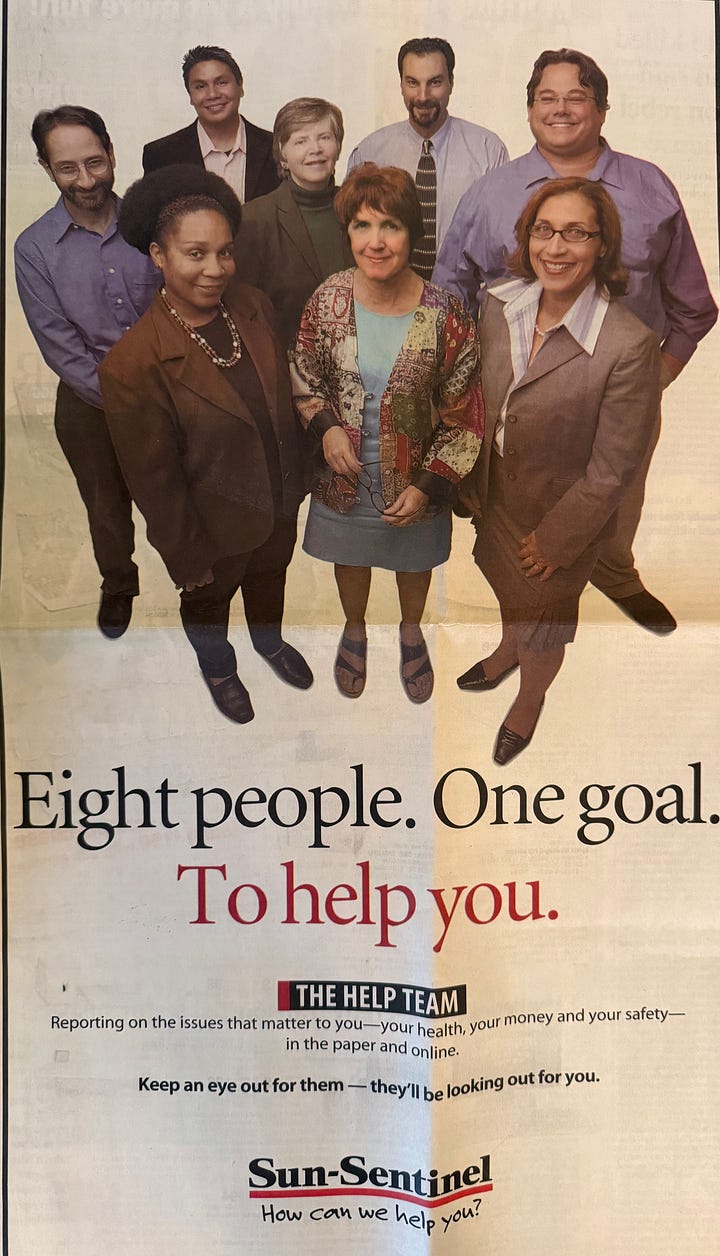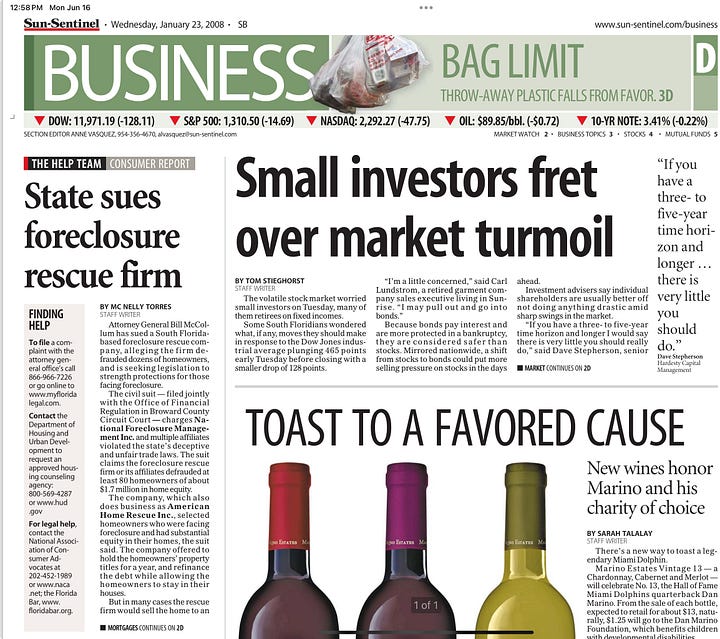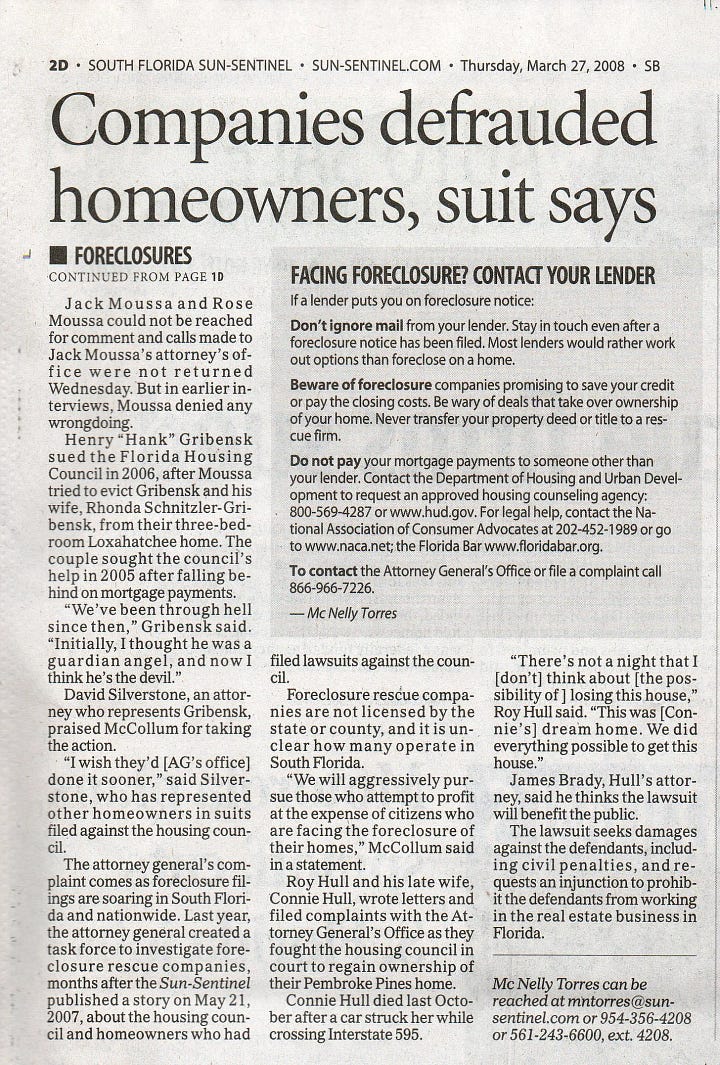Let’s talk about this: The essential art of the interview
To produce good stories, journalists need to be able to interview people, even when those people are reluctant.
Welcome back to Don’t Forget My Voice, a newsletter to help you navigate journalism’s chaotic and toxic maze. I’m Mc Nelly Torres, a longtime investigative journalist, editor, trainer and mentor.

Two decades ago, I moved to South Florida because it was one of the best places to be a newspaper reporter.
The area’s unique culture and location have always spawned corruption, fraud, waste and abuse. The characters behind this nefariousness tend to thrive there with little or no accountability.
That is, until someone complains to a reporter.
I was a consumer investigative reporter at the Sun-Sentinel in Fort Lauderdale in 2006 when I began looking into a foreclosure rescue scam known as Florida Housing Council and the skillful con artist behind the company, Jack Moussa.
Moussa was one of those Florida characters so many reporters like me have encountered over the years. They have all been in legal trouble, sometimes frequently, but always manage to escape and move onto the next scam. It’s their particular magic.
Victims of this scam, scattered all over Palm Beach, Broward and Miami-Dade counties, were working-class homeowners who were struggling financially and fell behind their mortgage payments.
They all thought FHC was a quasi-government agency that would help them save their homes.
But they were wrong.
A belligerent subject
I’ve spent months investigating this foreclosure rescue scam outfit, gathering documents and finding inconsistencies and patterns in them as I interviewed victims, housing market experts and attorneys.
After a while, it was time to interview Moussa. His interview would be among the most memorable I’ve ever done throughout my career.
For personal safety, I never go alone into interviews. I want witnesses present and I always record the interviews.
As I’d suspected he would, Moussa brought his attorney when we met at a Palm Beach County office building. They sat across from me and my colleague, another reporter, at a large conference table.
I had prepared questions and brought two binders full of documents — which were basically the contracts executed and signed between the homeowners and FHC. The interview quickly turned tense. As I began asking about inconsistencies in the documents, Moussa grew annoyed and started screaming at me, sometimes using racial and misogynist epithets.
Because I’d been in similar situations, I knew to keep my cool. I needed to be professional and ignore his behavior.
I wondered whether Moussa was just short-tempered or whether he was worried about the story. Moussa’s behavior vexed his attorney and made him impatient. Eventually, the attorney asked Moussa to follow him outside the conference room for private counsel.
We heard them bicker loudly in the corridor.
“Jack! Jack! You need to shut the fuck up, Jack! Did you hear me? I’m going to drop you (as a client) if you don’t shut the fuck up!”
After this exchange, they returned to the conference room to continue the interview. Moussa still couldn’t explain how he was helping these homeowners. In some cases, he created a trust partnership agreement between FHC and the homeowners, under which FHC promised to clear existing debt, Moussa told me. I wanted to know details about the “trust.”
Moussa never answered my questions.
One homeowner I interviewed thought he was getting a federal loan. Four homeowners said Mousa told them FHC was a federally funded agency that helped homeowners in financial distress. Many of these homeowners were so desperate that they signed the documents transferring ownership of their properties to FHC or another company also related to Moussa, without reviewing the documents or obtaining legal advice.
And Moussa made it convenient for the homeowners. Homeowners told me how he came to their homes and persuaded them to sign the documents right there before they could read them or consult a lawyer.
David Silverstone, an attorney who represented homeowners suing FHC and Moussa, told me then that FHC was taking advantage of financially desperate people.
“They (FHC) are saying one thing and then presenting papers that show something else. It’s hard for even an attorney to get through these documents.”
At the interview, I asked Moussa about the inconsistencies I discovered, such as when a notary’s signature was on documents even though homeowners I interviewed told me no notary was present. In other cases, documents showed witnesses’ signatures in besides the notary — a contradiction to what homeowners told me.
This was his trigger; he grew angry again and began raising his voice. He said our reporting had to be wrong because we didn’t, couldn’t have all the documents.
The attorney, again trying to defuse tension, dragged Moussa from the room and back into the hall. Again, my colleague and I heard the attorney and Moussa arguing profanely.




After Moussa and his counsel exited the room for a third timeout, we knew it was time to end the interview. We were getting nowhere. As we were leaving, Moussa and his attorney promised to share documents with us. We never got them.
I was confident then that there were no such documents because several of these homeowners were suing FHC and Moussa. The attorneys representing them shared everything with me.
The story the interview yielded was part of a two-part series published May 21, 2007, on the Sun-Sentinel’s front page, above the fold.
This was the top:
“They thought the postcard came from an official government agency. The mailing from the Florida Housing Council, a South Florida foreclosure rescue firm, promised to help save their homes.
James and Teresa Johnson, parents of three children, said the firm gave them hope when they were about to lose their three-bedroom house in West Palm Beach.
Stroke victim Roy Hull and his wife Connie sought the company’s help when homeowners association fees threatened to push them into foreclosure in Pembroke Pines.
Cuban immigrant Hector Irizarry and his wife, Olevene, called the number on the card when they fell behind on their mortgage payments on their modest ranch house in Miami.
All three couples said they signed FHC documents without scrutinizing them. They say they trusted Jack Moussa, the registered agent of FHC, who promised to help them avoid foreclosure. And they said they signed documents without knowing their signatures gave control and, in some cases, ownership of their properties to FHC.”
I continued to report on other foreclosure rescue schemes and mortgage fraud, especially after the 2007-08 financial crisis devastated the housing market, the construction industry in Florida.
A year after this story was published, the Florida attorney general’s office sued Moussa, his wife, FHC and other companies they owned.


Some interviews require patience
The ability to interview people and persuade them to share important information sets good journalists apart from average ones. And good interviews, confrontational or not, start with homework and preparation.
Broadcast investigative journalists are excellent at this prep. They think through the entire interview, write questions in a selective order and forecast possible responses. In rehearsal, these reporters imagine how interviewees will respond, how the conversation will shift and what they’ll say when it does.
This rehearsal is one of the best skills I learned during my years as an investigative producer in Miami.
Here are more tips for preparing for interviews, on camera or off:
Assemble your exhibits: Bring the key documents to the interview and keep them organized.
Learn from the best: Imitate good interviewers. I learned about interviews from watching good attorneys as I covered felony and civil cases. I watched how they built questions, caught contradictions and commanded the facts. They sensed what was coming because they’d studied everything they could.
Connect with people you interview: Finding something I have in common with the people I’m interviewing helps me break the ice. No matter how different our careers or life paths have been, I’ve always found something to talk about with interviewers, maybe as small as how they take coffee or the route they drove to the interview site or whether they have pets at home. Finding something to spark small talk shows you are a person looking to talk, not an instigator looking for a fight.
Listen, don't argue: Have a conversation, not an interrogation. People are likelier to share when they feel comfortable; you can challenge someone without arguing. A good approach: ‘I’m trying to understand this, please tell me more about it.’
Recognize opportunities: Sometimes people say things you didn’t expect. So, expect surprises and seize them.
Ask the question until you get an answer: When an interviewee is evasive or won’t answer a question, keep asking it in different ways. This will often increase the odds of getting an answer. Don’t be afraid to end the interview if all of your efforts yield no results.
If I were interviewing Moussa today, I would have brought selected key documents instead of the binders and anticipated that he would evade certain questions.
Tom Petty once said, “The waiting is the hardest part,” but I might say it’s also the most valuable part, at least in interviews. To quote Benjamin Franklin, “He that can have patience can have what he will.”
That Moussa interview taught me that my patience and silence, even as I was rhetorically attacked, showed Moussa that I was in control. He couldn't intimidate me. I was the reporter who investigated the scheme and ultimately the reporter who would write the story that held him accountable.
I’ll expand on the power of silence in a future post.
Thanks for reading.
Follow Mc Nelly on Bluesky, Threads, LinkedIn, X, Substack Notes and be part of the community I’m building online. Drop me a note if you want to provide feedback, would like me to discuss a specific subject, collaborate or just to say hello at mcnellytorres@substack.com. Join our chat room here.
Never miss an update—every new post is sent directly to your email inbox. For a spam-free, ad-free reading experience, plus audio and community features, get the Substack app.
Tell me what you think
Be part of a community of people who share your interests. Participate in the comments section, or support this work with a subscription.




